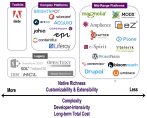Three continents, one SharePoint story
SharePoint has been on my mind a lot recently, not least because we have been undertaking more research on the product and its usage in an Enterprise Content Management (ECM) context.
I've also had the unusual opportunity to speak to integrators, resellers and buyers on three continents over the past couple of weeks. The questions I asked may not have been scientific, or statistically meaningful, but they have at least been consistent. For example when I talked to buyers I asked:
- Does your organization currently use SharePoint?
- Does your organization currently use any other ECM systems?
- Are you planning to replace any existing ECM systems with SharePoint?
The responses have been almost universally identical whether asked in India, Europe (the Netherlands), or the US. Almost all hands in the room go up for questions 1 & 2, and none at all go up for question 3.
Almost everyone licenses SharePoint at some level within their organization, almost everyone already uses legacy ECM systems. Almost no-one is planning replace these legacy systems with SharePoint.
Discussions with integrators and channel partners have also been consistent. The marked enthusiasm of the channel just a year back for SharePoint as a "Documentum or FileNet killer" has gone. In its place is the dawning reality that SharePoint is exceptionally good at a one thing -- group and department level document collaboration. It's not that it can't perform other services, it can - but they are not its sweet spot.
The other dimension -- which should have been abundantly clear a year ago -- is that you use SharePoint primarily for Microsoft Office documents (hence the name Microsoft Office SharePoint Services) and not for all the other content types and structures a typical enterprise encounters.
So if you remember back to the start of 2008 when we predicted that "SharePoint enters the valley of disappointment," it was a statement of some hyperbole -- and has in sense been proven at least half wrong. SharePoint buyers and users are not disappointed, they are in the main very happy when employing MOSS for sharing Office files.
Our prediction though proved to be correct though in another sense, inasmuch as the push to sell SharePoint as a replacement to ECM systems has to a large degree stopped -- a good thing for buyers, for in that direction lay serious disappointment. The fact is that buyers typically do not replace systems, be they ECM or otherwise. The growth in the data mountain and the ever changing demands to the business mean that IT adds to and attempts to enhance what is already there, rather than rip and replace. Into this reality SharePoint finds itself with a strong role to play, one that other ECM vendors have attempted in the past without success, and the Microsoft is perfectly suited for: collaboration sharing and management of Office files. It seems we underestimates the buying community, and over-credited the effectiveness of the channel marketing spiel.
CMS Watch has been accused of being anti-SharePoint in the past, yet nothing could be further from the truth. What we are is pro-informed buyer (which is why we publish the SharePoint Report!) It appears now that the channel was far more to blame for SharePoint confusion and mis-selling, at times than Microsoft itself, though Redmond's liberal use of the term ECM certainly didn't help. It also seems though that many buyers saw through the hype, and have recognized the true value of SharePoint. All I can say is, long live common sense!








